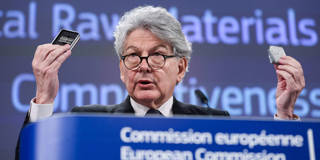The European Union has recently undergone a “geopolitical awakening,” with member states recognizing the need for greater sovereignty to ensure their security, not only in terms of defense, but also with regard to the economy and, more broadly, Europe’s vision of the world. And that will require a strategy for economic statecraft.
PARIS – The European Union currently faces two main challenges: achieving the green transition and exercising economic leadership. Both are existential in nature. Just as the green transition is vital to protect the planet on which our survival depends, economic leadership is essential to preserve the democratic, environmentally friendly, market-based model that underpins our way of life. Economic statecraft offers a means of meeting both challenges.
For Europeans, the exercise of economic statecraft will require a radical change of mindset. We are accustomed to being an economic superpower, but we are still learning to wield political power. In fact, the EU has always refrained from thinking in terms of economic statecraft. Its development was driven by trade, and supported by a constantly evolving but ultimately predictable rules-based international economic order.
But the world has changed. Over the last two decades, and especially in the last few years, a series of shocks – from the COVID-19 pandemic to Russia’s full-scale invasion of Ukraine – have highlighted the vulnerabilities that can arise from interdependency. As a result, the EU has undergone a “geopolitical awakening,” with member states now recognizing the need for greater sovereignty to ensure their security, not only in terms of defense, but also with regard to the economy and, more broadly, Europe’s vision of the world.

PARIS – The European Union currently faces two main challenges: achieving the green transition and exercising economic leadership. Both are existential in nature. Just as the green transition is vital to protect the planet on which our survival depends, economic leadership is essential to preserve the democratic, environmentally friendly, market-based model that underpins our way of life. Economic statecraft offers a means of meeting both challenges.
For Europeans, the exercise of economic statecraft will require a radical change of mindset. We are accustomed to being an economic superpower, but we are still learning to wield political power. In fact, the EU has always refrained from thinking in terms of economic statecraft. Its development was driven by trade, and supported by a constantly evolving but ultimately predictable rules-based international economic order.
But the world has changed. Over the last two decades, and especially in the last few years, a series of shocks – from the COVID-19 pandemic to Russia’s full-scale invasion of Ukraine – have highlighted the vulnerabilities that can arise from interdependency. As a result, the EU has undergone a “geopolitical awakening,” with member states now recognizing the need for greater sovereignty to ensure their security, not only in terms of defense, but also with regard to the economy and, more broadly, Europe’s vision of the world.